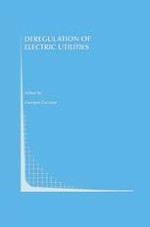1998 | OriginalPaper | Buchkapitel
Peak Load Problem, Deregulation and Reliability Pricing
verfasst von : Pierre-Olivier Pineau
Erschienen in: Deregulation of Electric Utilities
Verlag: Springer US
Enthalten in: Professional Book Archive
Aktivieren Sie unsere intelligente Suche, um passende Fachinhalte oder Patente zu finden.
Wählen Sie Textabschnitte aus um mit Künstlicher Intelligenz passenden Patente zu finden. powered by
Markieren Sie Textabschnitte, um KI-gestützt weitere passende Inhalte zu finden. powered by
One of the most important problems facing an electric utility is management of peak load demand. An estimate suggests that, on average, almost 40% of production capacity is idle in the United States ([Sioshansi (1990))], which corresponds to capital cost of $ 224 billion. Figure 12.1 illustrates this situation, where the load duration curve shows that a large proportion of the installed capacity (in MW) is used only for a short period of time. Idle capacity is a common feature of many industries, and in the case of utilities has its root in the basic axiom of absolute demand satisfaction (or 100% reliability) and in common pricing practice. In the average cost pricing tradition in North America all customers pay the same price, regardless the actual production cost and their value of service. This arrangement leads to inefficiencies because those who can postpone part of their demand to non-peak periods have no incentive to do so. This pricing tradition has also been criticized for its lack of fairness.
